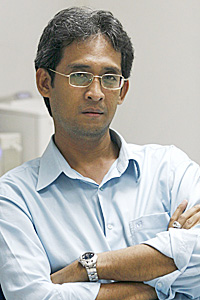
At first glance, it looks as if there could be big changes to Thai politics, as the general election tentatively set for Feb 24 draws near, with many new political parties established in recent months under new political and legal conditions. But Thai politics has, in fact, just followed its familiar pattern of putting old wine in new bottles.
Monday was the deadline for politicians to apply for party membership in order to be eligible to contest the poll, so this week has been chaotic for the many who have had decisions over defections to other parties to make.

Soonruth Bunyamanee is editor, Bangkok Post.
The spotlight has shone on the Palang Pracharath Party (PPRP), which is said to be a vehicle for the military regime to bring back Gen Prayut Chan-o-cha to be prime minister for the second time after the election. Many politicians have switched camp to the PPRP which, by favourable constitutional conditions set by the coup-installed charter drafters, is expected to win a ticket to form a coalition government after the election. Their defections are obviously driven by a desire to be part of the next government.
The defections are also thought to be a product of work by the Sam Mitr (Three Allies) political group led by veteran politicians Somsak Thepsuthin and Suriya Juangroongruangkit, former key Pheu Thai Party figures who have managed to bring 60 politicians, mostly former MPs, to join the PPRP.
But a big surprise is the defection to the PPRP of several key Pheu Thai members. They include a group of former MPs for Kamphaeng Phet led by former PM's Office Minister Varathep Rattanakorn, former Lop Buri MP Amnuay Klangpha, and Dejnattawit Teriyapirom, son of ex-commerce minister Boonsong Teriyapirom (who was given a 42-year prison sentence for his involvement in fake government-to-government rice deals), and former Sa Kaeo MP Thanis Thienthong.
Interestingly, Jureeporn Sintuprai, a businesswoman and a Roi Et politician, also decamped from Pheu Thai to the PPRP. Ms Jureeporn together with her brother Nisit Sintuprai, a United Front for Democracy Against Dictatorship (UDD) co-leader, led a red-shirt anti-government protest in Pattaya in 2009.
The PPRP may celebrate their popularity among those defecting politicians. Unfortunately, anyone hoping for positive changes to Thai politics has no reason to celebrate. Still remember Gen Prayut's four controversial questions floated to the Thai people last year? They were:
Do you think the next election will bring a government with good governance?
If that is not the case, what should be done?
Elections are an integral element of democracy. But is it right to assign importance to elections alone without consideration for the country's future such as national strategy and reform?
Do you think political groups with inappropriate behaviour deserve a chance to run in elections? If they return and conflicts re-emerge, who should solve the problem and by what means?
The prime minister did not go into detail about the "inappropriate" political groups he mentioned. But it is known that he was apparently implying the pro-Thaksin and Pheu Thai camps.
Before coming up with those four asks, Gen Prayut also floated six questions to the people. They included: Whether or not it is now necessary for the country to have new political parties, new-face and quality politicians for the people to choose from in the next election? If the country continues to have only the established political parties and old faces and they happen to be in the next government, will the new government continue with reform in line with the national strategy?
Gen Prayut often used the term "bad" when he mentioned politicians in his speeches prior to his recent revelation that he now has an interest in politics. He used to ask audiences what would happen if "bad politicians" returned after the election.
That really struck a chord because Thai politics has faced a crisis of confidence for years. At first, Gen Prayut's remarks brought the hope of change for the better under his and the military regime's guidance.
But the PPRP, as a machine to return Gen Prayut to power, has delivered something we didn't hope for. Most politicians defecting to the PPRP are "the old faces" and many of them seem to be from the group Gen Prayut called "bad politicians".
Gen Prayut and his deputy, Gen Prawit Wongsuwon, have distanced themselves and their National Council for Peace and Order (NCPO) from the PPRP despite the fact that four of their cabinet ministers have become executives of the party. Needless to say, the Thai people are well aware of their connections with the party.
PPRP executives say the party will make changes to the country. I wonder how they can do it with the same old politicians. What they could do is contest the election in the old ways -- by campaigning through canvassers appealing to political bases.
The PPRP's political model is not new. It is the same model adopted 20 years ago by the now-dissolved Thai Rak Thai Party, the political establishment from which Pheu Thai was spawned. This is hardly a surprise because Deputy Prime Minister Somkid Jatusripitak was a Thai Rak Thai executive and key to engineering the success of party at the time.
The PPRP may be pinning their hopes on this model winning them the election just as Thai Rak Thai did.
But I think the party's manoeuvres have, in fact, landed it in a political dilemma. Many people, even those who support Gen Prayut, appear disappointed by its cynical adoption of old political strategies and may want to punish those politicians by not giving them their vote.
The upcoming election should be a time when Thai politics is changed by voters. That means parties should come up with policies that will drive the country and its politics forward, not the other way around.
